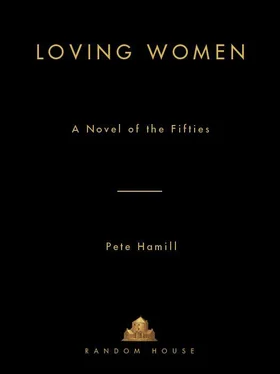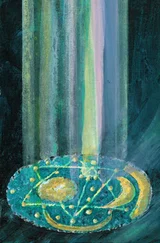She came back down the length of the packed bar, waved at a woman at one of the tables and then bumped into me.
“Uh, sorry, scuse me,” she said in a furry small girl’s voice. She was about my age. Maybe a little older. Maybe twenty.
“My fault,” I said. “Blockin the way.”
She looked at Bobby Bolden. “Whatchoo dune bringin this poor white boy here, Bobby Bolden?”
“To meet you, Little Mama.”
“You such a bad ole boy,” she said.
“What you drinkin?”
She asked for a rum and Coke and I looked at her face: curved nose, small hard nostrils, full lips. Her dress was cut low and her breasts looked solid and full. She was wearing perfume. Sweet perfume. Dark perfume. She asked me my name and I told her and she said her name was Winnie and where was I from and I said New York and she smiled and her eyes got brighter, and Bobby Bolden looked at the ceiling and the messcooks gave me a deadpan look and then laughed together. Winnie gave them a killer glare.
“Ahm jes trying to make the boy feel welcome and yawl ack like chilrun .”
“We jus admirin yo style , Winnie,” Rhode Island Freddie said. “Dats a lie,” she said. “Yawl is thinkin I want to take this boy home .”
“It snow the second time this wintuh if you do,” Bumper said. “White stuff in the chicken shack.”
“See the lowlife yuh bring here, Bobby Bolden? You and the white boy and six dumbass zigaboos.” She turned to me and shook my hand. “Well, please to met you, Michael. Come back sometahm, ’thout the lowlifes.”
“Hey, Winnie,” Bobby Bolden said. “Don’t—”
But she walked away and went back to the table.
“Saved,” Rhode Island Freddie said, draping a big hand on my shoulder.
And in a way I was. When Winnie walked away, I didn’t have to choose to go with her or even to try. I didn’t have to choose a betrayal.
The truth was simple: after a few short weeks, Eden Santana had become a presence in almost everything I did. I filled pads with drawings of her. I sometimes had to stop myself in the middle of drawing the wives and girlfriends of sailors because I kept making them look like her: blondes, brunettes and redheads acquired her hair or her eyes or the mole on her cheekbone. When I read a novel from the base library, the women all resembled her, even Daisy Buchanan and Catherine Barkley. On those nights when I was the duty storekeeper, alone in the Supply Shack listening to dramas on Harrelson’s radio, the women characters all appeared to me as Eden. I drew her so much, in so many different positions, that I could recall her body at will, sitting at my desk, doodling on scrap paper with an Ebony pencil, and had to keep hiding the drawings so the others wouldn’t see her. They knew I had somebody out in that mysterious world called “off the base.” But they didn’t know who she was and I wouldn’t tell them.
On three straight Sundays she took me out to the empty parking lot at the beach and taught me how to drive. “You just gotta relax,” she said. “Just understand what you’re doing and then relax . No white-knuckle jobs holdin that wheel, child.” She sat beside me while I made circles around the lot, coming to abrupt stops, shifting gears, backing up in reverse, going forward again. “That’s good, that’s fine, just do that, watch what’s behind you, don’t look at the road , look up ahead , the distance, you’ll see everything anyway …”
There was a small hill leading over the dunes to Fort Pickens and I started up there on the second Sunday, brimming with confidence, when a truck came roaring over the rise, right at us, black, faceless. I panicked, and whipped the wheel around, driving it straight into the path of the truck, and then pulled it the other way, while Eden yelled “Right! Right !” We ended up stuck in the sand as the truck roared on. My hands shook. And I was so afraid I couldn’t move: frightened of taking this ton of rubber and steel in my hands again and ending up mashed in the grille of another truck. Eden lit a cigarette and inhaled deeply. She said: “Better get back on the horse, child.”
And I did. We got the car out of the sand, pushing and heaving until we got traction, Eden laughing through it and telling me I’d remember that moment all my days. And then I took the wheel again and went up over the rise, more slowly now, thinking right , go to the right , if someone comes barrel-assing down the road, go fucking right . But the road was empty and I shifted gears more smoothly and Eden laughed out loud and hit the dashboard with the palm of her hand. “Yeah! Good! Go do it !”
She let me drive back to the mainland across the causeway that day, and then switched seats with me for the ride home through traffic. “You got it, don’t you worry now,” she said. “You got it …”
I had some money from the drawings, and I said (trying to sound like a man) that I would pay for the food from now on (since that’s what men did). After all, she did the cooking; and another thing: when we went off in the car for drives or lessons, I should pay for the gas. “It’s only fair,” I said, and she shook her head in an amused way and said, “If you say so.”
Most of the time we went to Stop & Shop and picked up steaks at thirty-three cents a pound or shrimps for a quarter a pound and black-eyed peas for a nickel (ah, the fifties!) and with water, spices, salt and care, she’d turn these plain goods into food I’d never tasted before and have seldom tasted since. The process was as mysterious as art; casein wasn’t art, it was something you used to make art; peas in her hands were the same. She prepared for meals the way a painter might prepare for a new canvas, first studying the newspaper, reading the ads for bargains and in her quest often expressing high moral outrage. Look, she’d say, at this A&P ad: round steak has gone up to fifty-nine cents a pound! That’s a damn shame ! And a five-pound bag of oranges is now thirty-seven cents (her voice rising). In Florida! But then she would see a twenty-eight-pound watermelon for $1.10 and Peter Pan peanut butter for thirty-five cents and her anger would ebb and we’d go off to the A&P, instead of Stop & Shop or Plee-Zing on T Street. She said she hoped I didn’t think she was cheap. But she felt responsibility, she said, ever since I insisted on paying for the food. “People work hard for their money,” she said, “they better spend it hard. Not easy.” And when the food was back home, she would begin the magical process of changing it. Food had never been so sensual.
As the days grew longer and warmer, she moved some of the plants and flowers outside, making a small garden beside the trailer. She bought two folding chairs at Sears, and we’d sit outside sometimes and look at the small lake that fed the River Styx, with the trailer like a silver wall between us and the bumpy dirt road that ran through the colored district.
“I saw your friend, that Bobby Bolden, around here the other night,” she said one Sunday afternoon. She was quiet for a long moment. “He’s got a white woman in a house back there in the woods.”
“That bother you?”
She gave me a funny look. “Well, I wonder about it.”
“It’s their business, I guess.”
“Yeah. Till someone makes it their business.”
“Like who?”
“Oh, hell, any body.… Some black lady jealous of a white woman. Some damned redneck. You never know …” She looked at me. “This is the South, you know.”
“Yeah,” I said. “I heard.”
We didn’t talk about it any longer that day.
Читать дальше












